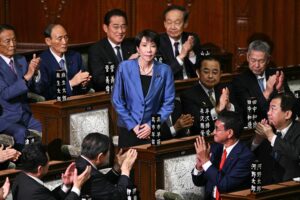Sanae Takaichi: Japan’s First Female Prime Minister Sets Bold Course for Economy and Security
Japan’s first female prime minister, Sanae Takaichi, has stepped onto the world stage with an agenda as historic as her appointment. In her first policy speech at the Diet on October 24, she promised to turn anxiety into hope through aggressive spending and strategic rearmament, a dual effort to shield Japanese households from rising prices while preparing the nation for an era of geopolitical uncertainty.
Takaichi’s emphasis on building a strong economy, is a phrase she repeated six times, which reflects the pressure on families and small businesses facing Japan’s worst cost-of-living surge in decades. Her plans to cut gasoline taxes and raise income tax exemptions signal direct relief for workers and households. Yet her approach also has a deeper cultural dimension: it seeks to restore faith in a social model shaken by economic stagnation, demographic decline, and youth disillusionment.
Her proposal to blend fiscal stimulus with responsible policy states a pragmatic, family-centered philosophy. By coupling cash benefits with tax reforms, Takaichi hopes to revive consumer confidence without triggering the debt crises that have haunted previous governments. Analysts see this as a bid to reconnect the ruling establishment with everyday citizens, whose trust eroded amid political scandals and economic inertia.

But Takaichi’s vision extends far beyond the economy. With defense spending set to rise to 2 percent of GDP by 2025, she has positioned Japan for its most significant military expansion in half a century, with a move that could redefine regional power dynamics. Her rhetoric of crisis management investment, speaks not only to national defense but also to commitment in food supply, swift disaster response and clean energy independence. In many views, it indicates a government preparing for instability as the new normal.
Socially, her speech reflects both modern ambition and conservative restraint. Despite breaking Japan’s highest glass ceiling, Takaichi made no mention of gender equality or women’s empowerment. To many women, her silence on these issues felt like a missed opportunity to champion inclusivity in a society where work-life balance, childcare and pay equity remain unresolved challenges. However, culturally her rise in politics itself has shown a symbolic power-proof that Japan’s political hierarchy, long dominated by men, can evolve.
Her cautious remarks on immigration, welcoming only those who follow the rules, highlight Japan’s struggle to reconcile demographic reality with social unease. With foreign residents now exceeding 3.9 million, and one in thirty babies born to foreign parents, Japan faces a quiet transformation of its family and cultural landscape. Takaichi’s administration seems determined to manage this shift carefully, balancing openness with national cohesion.
Takaichi political views, governs from fragile ground. Her coalition with the right-leaning Japan Innovation Party (Nippon Ishin), gives her momentum but not a majority. The partnership hints at a more nationalist policy turn, especially in defense and immigration, even as she pledges to cooperate “flexibly” with opposition parties. Her ability to navigate these divides will test both her strategic acumen and her capacity for consensus-building. These traits are essential tools for leading a society wary of polarization.
![]()
On the diplomatic front, her pledge to strengthen ties with the US and reaffirm Japan’s commitment to a free and open Indo-Pacific, situates her within the legacy of her mentor, the late Shinzo Abe. Yet her balanced tone toward China. Labeling China as a “concern” and a “neighbor”. In suggestive insight that she understands the economic interdependence that underpins Japan’s prosperity.
In essence, Takaichi’s administration stands at a point of tradition and transformation. Her policies aim to make Japan stronger and more self-reliant, yet her leadership also embodies a cultural milestone; a woman commanding a nation and still negotiating its modern identity.
Whether she succeeds will depend not only on economic metrics or defense budgets but on how her government reshapes the realities of Japanese families, from household stability through workplace equality, social trust and to the meaning of belonging in a changing Japan.








